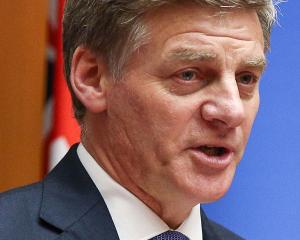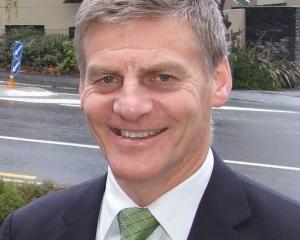The last time anybody looked up the National Party's official guiding principles, pragmatism was not listed as being one of them.
Equality of opportunity? Yes. Individual freedom? Absolutely. Personal responsibility? Of course.Pragmatism? Definitely not.
In John Key's universe, however, pragmatism is not a dirty word. It is actually deemed to be one of National's core values.
Or so the prime minister suggested in the annual John Howard Lecture, delivered in Sydney on Thursday.
Some might say Mr Key was just being honest; if patriotism is the last refuge of the scoundrel, then pragmatism is the unspoken preserve of conservative-minded politicians like him.
Mr Key, however, does not bother to hide his pragmatism or try to dress it up as something more worthy. As Thursday's speech revealed, he positively rejoices in it.
Some on the left have long argued Mr Key's portrayal of himself as a moderate conservative is just a front and that behind the friendly visage lurks a cool-blooded animal as keen to push a free market-oriented agenda as any disciple of the New Right.
Given he is in his fourth year as prime minister, such an alter ego would surely have emerged by now.
Certainly, the National minority Government has undergone a slight lurch to the right since last year's election, beating the drum on welfare reform, getting more hard-nosed on housing the poor, seeking to break the power of the teacher unions, slowly privatising the public service, and, of course, floating portions of state-owned companies on the stock market. With the exception of the charter schools experiment, however, Key-led National is hardly Act New Zealand in drag.
One reason why Mr Key wears his pragmatism almost as badge of honour is that he has little choice. MMP and multi-party Parliaments have shifted the onus to prime ministers being good managers rather than great reformers.
Tidy management - the missing element in National's rather chaotic first six month of this year - is paramount. As for reform, the cruel mathematics of MMP mean it can only be achieved in incremental bites if a party wants to stay in power.
The pending part-asset sales are testimony to that. Everyone knows the mixed-ownership model is nothing other than a halfway house to the power generators eventually falling completely into private hands.
National's unconvincing pretence otherwise is one reason why it has lost the debate over asset sales.
Such limitations on governing power under MMP were acknowledged by Mr Key in Thursday's speech.
He argued that, over a period of time, a series of moderate changes could still add up to a considerable programme of government activity.
The question is whether Mr Key's preference for keeping the bulk of the public on side on most issues most of the time holds National back from doing more as the governing party.
That clearly has not been the case this year. But it has also been a very torrid six months for National. The party may have suffered only minor damage in the polls. And there is as yet no sign that voters see Labour as a suitable and ready alternative.
But the Government and opposition blocs are now level-pegging. The margin for error on National's part is now approaching zero.
Thursday night's speech sounded like a pitch for the centre vote; a bid by Mr Key to reassert National's dominance in that crucial swing-voter territory after the palaver over partial state asset sales and the hullabaloo surrounding now-abandoned increases in teacher-pupil ratios.
What the speech was not was a clarion call for radical reform.
Whether it marks the end of National's post-election lurch to the right remains to be seen. But there is no question where Mr Key feels most comfortable.
There are signs he and his colleagues are listening again; that the Government is once again focused on reading the mood of the public and responding accordingly.
The fatal mixture of bravado and arrogance which was starting to creep into the Beehive and seems to have dissipated.
It has been replaced by a gritty realism that, with no money to spend and an economy barely ticking over, the job of grinding out victory in 2014 starts now. That is going to require that National gets itself on the right side of the argument on every issue, thus squeezing Labour to the margins.
It helps the public is not in the mood for luxuries such as a fully functioning emissions trading scheme.
The tide has well and truly gone out on those seeking a tougher climate change regime. The great majority of the public now want economic growth above everything else, even if that has environmental impacts - something highlighted by this week's Herald-DigiPoll, which had nearly 70% of respondents supporting an increase in oil, gas and mineral exploration.
Much of the change in National's frame of mind can be put down to one thing. The public backlash on increased teacher-pupil ratios was a much-needed wake-up call.
It is pure conjecture, but Mr Key may have accepted, while he would wish to leave a reform of major proportions as the legacy of his tenure, he will not be remembered as that kind of prime minister.
He is more likely to be remembered as a popular prime minister, who was good at managing major crises and winning elections. With regard to the latter, it is no accident his speech drew on Sir Keith Holyoake as the model for what National stands for.
Whether by accident or design, however, it is another National prime minister whose phraseology Mr Key has adapted to measure his success.
Mr Key says the test of any prime minister is whether he or she leaves the country in better shape than when he or she inherited it.
It is a somewhat higher test than the one Sir Robert Muldoon applied to his tenure - that he hoped to leave the country no worse off than he found it.
John Armstrong is The New Zealand Herald political correspondent.




